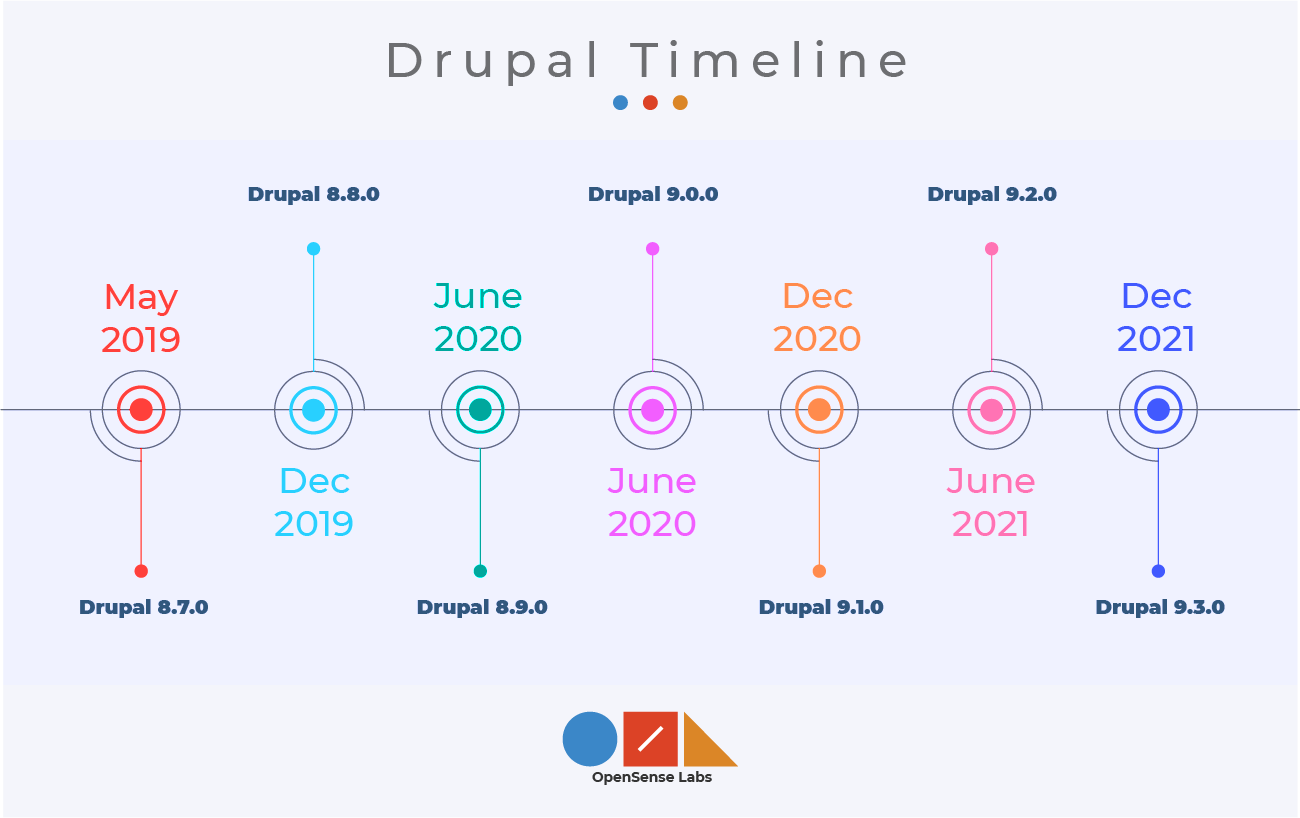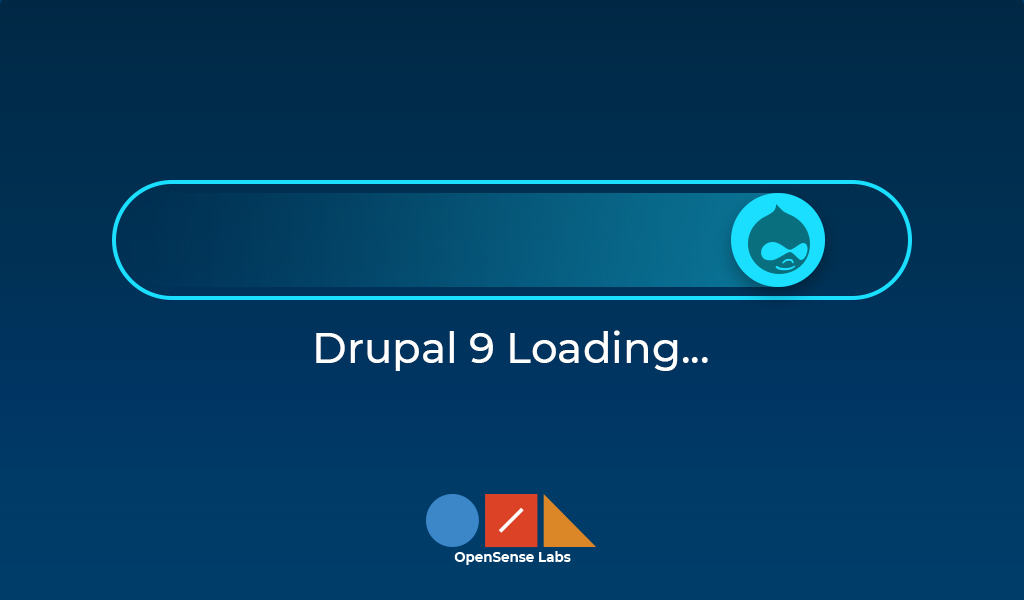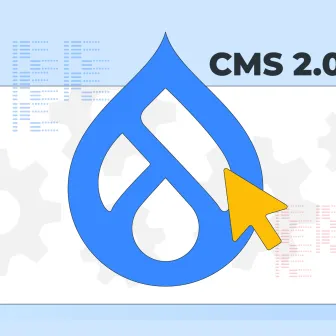With Drupal 9 on the verge of release in June 2020, the Drupal community has about 18 months to map out a transition plan. The latest versions of Drupal in recent times saw a major breakthrough from the past versions. As the philosophy of development has changed, Drupal 9 is said to be built in Drupal 8 and the migration will be super easy this time.
Released in 2011, Dries announced the end-of-life (EOL) for Drupal 7 to be due in November 2021 after serving for more than 8 years. However, many people are still on Drupal 7 given the compatibility issues in the two versions which caused major disruption and migration became a task for developers. However, the new philosophy makes it easier to plan and anticipate any unforeseen obstacles that you may encounter. Are you prepared for it?
Planning for Drupal 9?
Launching with the objective to modernize the dependencies such as Twigs and Symfony and to remove support of deprecated APIs, Drupal 9 is making its way into the Drupal community soon.
Every new information being released about the update and new features is gearing us up for the big leap. The first and foremost action to be taken in consideration is to plan and upgrade no later than the summer of 2019. Experts believe, as long as your modules are updated with minor releases like Drupal 8.7 and the upcoming Drupal 8.9 in December 2019, there won’t be much to worry during the main release of Drupal 9. Being up to date with Drupal 8 is a crucial step for adaptability and easier usability in the future.
Dries Buytaert wrote recently in a blog:
‘’Instead of working on Drupal 9 in a separate codebase, we are building Drupal 9 in Drupal 8. This means that we are adding new functionality as backwards-compatible code and experimental features. Once the code becomes stable, we deprecate any old functionality.’’

What’s New in Drupal 9?
With a lot of buzz around the new features to be delivered, let’s understand a few important reasons for the strategic release of Drupal 9:
- The innovative model of Drupal 8 had new releases every six months which led to adding of new features and enabling improved ways of problem-solving. However, Drupal 9 will deprecate the codes which are needed for backward compatibility. In the process, it will provide an opportunity to remove the codes and anything else that is no longer needed.
- As of now, Drupal needs to adhere to the vendor support life cycles and integrates with common PHP projects like Twig and Symfony. But the third-party dependencies will reduce with Drupal 9 and we’ll have supported versions of software for a long time such as Twig 2 and Symfony 4/5.
Why upgrade Drupal 8 when Drupal 9 is coming?
Drupal 9 is not being built on a new core and its functionalities will not look alien to Drupal 8 users. Instead, they will be added to D8 as backward-compatible code. Only with time and familiarity, as the new features will hold a stable position and mark their success, the older counterparts will be deprecated. As a result, D9 will be stripped of all deprecated code and only the complete collection of stable features will be termed as Drupal 9.
For example, in Drupal 8.0.0, the Drupal::l($text, $url) was deprecated. Instead of using \Drupal::l(), you can use Link::fromTextAndUrl($text, $url). The \Drupal::l() function was marked for removal as part of some clean-up work.
What does it Mean…
With no new paradigms of development and yet being a big leap, how will Drupal 9 change the workings?
For Core Contributors:
Your tasks will get limited in Drupal 9 even before the release. Making the quality robust and release more predictable, new features will remove deprecated functionality and lead to Drupal's dependencies to a minimum.
For contributed module authors
Similarly, authors can also start working on the compatibility issues before the release as their Drupal 8 know-how will still remain relevant in Drupal 9 with no dramatic changes in the core.
For Drupal site owners
The release of Drupal 9 will make the up-gradation much easier for site owners. It will be the same as Drupal 8, only with its deprecated codes removed. According to the experts, keeping your modules and themes stay up-to-date with the latest Drupal 8 APIs will do and a 12- to 18-month upgrade period will be sufficient.
What happens to module, profile and theme maintainers?
Though existing Drupal 8 sites have a year and a half to upgrade to Drupal 9, the technology in Drupal 9 would be already battle-tested in Drupal 8. The set of tasks for module and theme maintainers involve getting updated with the new and better APIs. It would be a mandate to check if your code is compatible with Drupal 9 as it may hold invalid when sites migrate. However, do not wait till the release of Drupal 8.8 which is expected at the end of 2019. As six months will be a limited time to upgrade to Drupal 9 for complex codes, it’s advisable to start assessing now.
How to Prepare for Drupal 9
The big catch in this whole drill of migration is to make sure that you no longer use the deprecated codes. Following are few ways suggested by Acquia:
- Be updated with Drupal 8 features and modules
- Create a report for deprecation using Drupal Check.
- Check for your active modules which might be deprecated at api.drupal.org
- Address a consolidated list of errors that can occur and need up-gradation to Drupal 9 by generating a ‘’readiness assessment’’.
- Use the latest versions of dependencies in line with Drupal 9.

Wrapping it up
As Drupal 9 will emerge like a phoenix from the ashes of Drupal 8, Buytaert sums it up best, “The big deal about Drupal 9 is that…it should not be a big deal.”
Excited? Have questions about how Drupal 9 will impact your site? Want to chalk out a plan for up-gradation? We are here to help. Drop a line to our experts at [email protected].
Subscribe
Related Blogs
Drupal's Role as an MCP Server: A Practical Guide for Developers

"The MCP provides a universal open standard that allows AI models to access real-world data sources securely without custom…
What’s New in Drupal CMS 2.0: A Complete Overview

"Drupal CMS 2.0 marks a significant change in the construction of Drupal websites, integrating visual site building, AI…
Drupal AI Ecosystem Part 6: ECA Module & Its Integration with AI

Modern Drupal sites demand automation, consistency, and predictable workflows. With Drupal’s ECA module, these capabilities…




